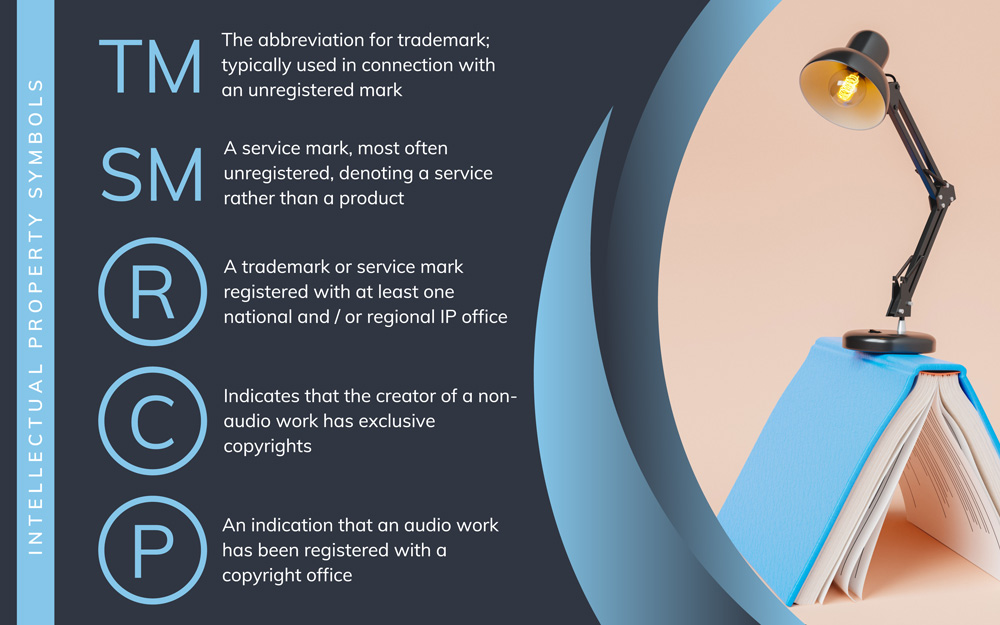
® vs. ™: Which trademark symbol should I use and when?
Trademarks are the cornerstone of a business identity, and successfully registering them for your organization's products or services is a cause for celebration. This practice is vital for defending logos, symbols, names, slogans and many other branding elements from imitation or unauthorized use.
Distinctive, highly recognizable trademarks can do much more than signal your brand to consumers, though this is their legal purpose. They are able to communicate a business philosophy succinctly and create a valuable emotional connection with the public, so demonstrating their protection status is indispensable. But as with other forms of Intellectual Property (IP), trademark regulations often vary from nation to nation. Knowing which symbol to use with a mark is critical to any commercial strategy.

What are the different trademark symbols?
There are three commonly used ways to denote trademarked IP:
- TM: This indicates a logo, symbol, product name, business name, slogan or other eligible piece of IP that is used in commerce as a trademark. It is usually associated with a mark that is not registered at the national or regional IP office of the territory where it appears. Legally, it signals that the user is attempting to claim IP rights to a given branding element.
- SM: For a service mark. It has effectively the same function as its TM counterpart but can only be used in connection with services (for example, IP portfolio management). As with TM, a mark associated with SM is generally unregistered. This is by far the least encountered of the major symbols.
- R: The "R inside a circle" ® is the most valuable trademark symbol as it confirms a mark's registration with an IP office. Be sure not to confuse the registered trademark symbol with the copyright symbol. The latter looks very similar but uses a C instead of an R inside the circle. In some jurisdictions, a circled P (for "phonogram") is used specifically with copyrighted audio.

Some countries allow endemic terms or symbols to signify a trademark's legal status within their borders. For example, in France, the term "marque déposée" can be used just as one would use the international symbol for registered trademarks. In Germany, the word "Schutzmarke" serves a similar purpose, as does the symbol "Wz." for "Warenzeichen," though this is mostly seen in association with older marks.
Why is the registered trademark symbol important?
The simplest answer to this question is that acquiring and signaling registration for your trademark confers the strongest protection. Though a registered trademark is not immune from infringement, your chances of receiving legal remedy are greatly increased by this status. Not only that, bad actors can be discouraged from committing wrongful acts by the likelihood of effective lawsuits taken against them. If someone replicates or closely imitates a registered trademark and deploys it in a commercial context for similar goods and services, they are setting themselves up for litigation that may lead to stiff penalties and biting reputational damage.
When are symbols for unregistered trademarks useful?
The TM and SM symbols are far from valueless. In fact, using them can be very important in numerous jurisdictions for eventually securing trademark registration. The relevant IP offices will expect to see evidence of either a mark's current use in commerce or your future plans to use it. Having the appropriate symbol alongside the mark reinforces your intent to establish the IP as part of your overall brand and can support your eventual application.

That said, the legal safeguards extended to an unregistered trademark are slight at best. Certain common-law trademark protections may be applicable against anti-competitive or unfair business practices, but these are typically enforceable only in more local contexts. For example, suppose an organization in a small U.S. state like Vermont uses an unregistered trademark that is extremely similar to a prior unregistered mark displayed by a business only 20 or 30 miles away. In this case, the owner of the older trademark could reasonably send a cease-and-desist letter. However, resolving this dispute would almost certainly require proof of which party started using their mark first, which itself could be difficult without the formalities of registration.
If the same thing happened to your unregistered trademark halfway around the world, the same principles likely would not apply. It would be difficult to conclusively establish that an atmosphere of unfair competition had been created, owing to the distance between the two businesses and the mark's unregistered status. Here, the statuary rights conferred by registering a trademark in individual jurisdictions can be decisive.
Last but not least, keep in mind that another significant benefit of registration is that you hold the right to license your trademark for use by other parties and earn royalties. Although unregistered trademarks and service marks can be licensed in many jurisdictions, there could be practical complications affecting the goodwill and reputation of a business.
Trademark symbol differences around the world
As can be expected, there are national specifics relating to how the ® symbol is required and used. Here are a few noteworthy examples:
- In Canada and Spain, it is not mandatory to use the ® symbol together with a registered trademark. This is because no symbol requirement is outlined explicitly in Canadian and Spanish trademark law. This could change with time.
- In other countries, including the United States, Mexico, Chile and the Philippines, failing to use the ® symbol in conjunction with registered trademarks can limit or even prevent you from taking action against infringement.
- Numerous countries penalize those that use the ® symbol without first registering the associated trademark with their domestic IP offices. This is considered false advertising or fraud in many EU contracting states. In Japan or India, misuse of the ® symbol under such circumstances could lead to fines or even imprisonment.
How to register your trademark
The first formal step on the road to trademark registration is always the filing of applications in those jurisdictions where you do business. All the same, there are some actions you can take to lay the groundwork and improve your chances of success. As mentioned, it may be necessary to provide documentary evidence of the trademark's prior or intended use in commerce, so preparing this ahead of time could factor into the process. Once you are ready to move ahead, it is wise to conduct a search of trademark databases. This will go a long way to ensuring your mark is not excessively similar to one already registered for the product or service types you are interested in.

When you are satisfied that an opposition is unlikely, it is time to file. A typical trademark application includes a description of the mark, a drawing and a list of the exact goods and services the trademark will designate. Most countries follow the international Nice Classification framework for denoting goods and services, but you must make sure your home jurisdiction does not have any additional or superseding requirements in this regard. Also, bear in mind that if your mark has any special characteristics, such as specific colors, or is not graphically representable, as with a smell, sound "or other completely non-visual matter," these aspects must be precisely detailed as well.
With your application carefully drafted, it is time to file and pay all appropriate fees (usually determined by the number of classifications covered). While you wait for a determination, be prepared to answer promptly and fully any questions or requests the registering office may have.
If the jurisdiction where you receive your initial registration is one of the 114 contracting parties to the Madrid Protocol, you can subsequently extend your registration to cover a total of 130 countries by entering the Madrid System administered by the World Intellectual Property Organization (WIPO). A single basic fee is all that is required, with a 90 percent discount for trademarks originating in the least-developed nations. However, because domestic law always takes precedence over WIPO rules and IP treaties, obtaining separate trademark registration in the jurisdictions most relevant to your brand is the best way to achieve thorough protection.
Maintaining your trademark
Registered trademark rights can be the bedrock of an IP portfolio simply because they can last indefinitely if renewed at the defined intervals – every 10 years in the vast majority of cases. This procedure will always involve a maintenance payment but may also require a declaration of use or other affidavit. By staying on top of your renewal obligations and following all rules regarding trademark symbol usage, the mark and all rights relating thereto will remain in force.
Comprehensive trademark management requires observing renewal dates across all jurisdictions and remaining vigilant for unauthorized use. The Dennemeyer global team has the expert knowledge to keep your IP fully protected the world over. Our attorneys and IP portfolio management solutions take the weight off your mind, allowing you to focus on what matters most: your brand.
Filed in

Learn why brand name and trademark law matter for your business, from marketing efforts to bottom lines.



